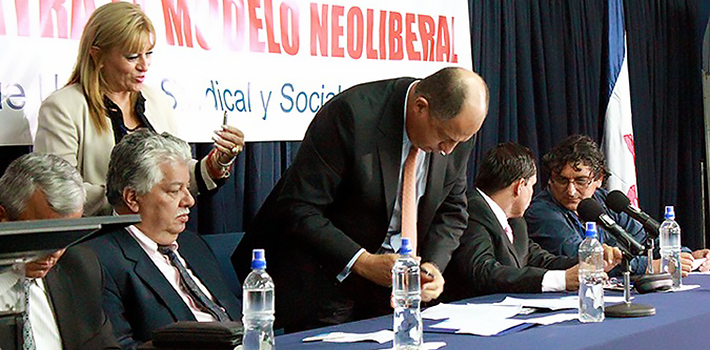
EspañolMany Costa Ricans mistakenly believe that socialist forces did not come to power in the most recent elections, but they did, even if indirectly.
On Tuesday, October 7, public university students protested proposed cuts to the Special Fund for Higher Education. The Executive irresponsibly set the 2015 budget for this fund at US$752 million, 14 percent more than in 2014. However, to be clear, even with the Commission of Budgetary Affairs’ reductions, $57 million would still be added to the fund — an 8.33 percent increase over 2014.
Without a doubt, Costa Ricans should be concerned about the president’s budget, which the unions will defend in the streets, even though it represents a 19 percent spending increase from 2014.
Despite this reality, students went ahead with the march. The protesters counted on support from President of the Congress Henry Mora, various other members of the Citizens’ Action Party, the entire Broad Front, and even President Luis Guillermo Solís.
“Careful deputies! We won’t accept cuts to the budget!” cried protesters, while also screaming insults at Deputy Ottón Solís. Deputy Jorge Arguedas took to the microphone and called Deputy Otto Guevara “nefarious,” and Deputy Solís Falla “shameless.” Meanwhile, students also chanted slogans, such as “Less religion! More education!”
Needless to say there were some questionable ethics on display. This type of behavior is to be expected from students, and it can be argued that they are simply exercising their right to protest. But is it acceptable to have had President Solís publicly support these protests?
Last week, Solís attended a conference hosted by labor unions, where he was seated under a banner that read: “National Unity Against the Neoliberal Model.” Without a doubt, Costa Ricans should be concerned about the president’s budget, which the unions will defend in the streets, even though it represents a 19 percent spending increase from 2014.
The ideological bend of our country has been made clear: President Solís has allied himself with the openly Chavista political faction of Costa Rica.
One could make the case that all of this still does not mean Solís is closely aligned with socialism. But let’s add the fact that he tapped Mariano Figueres, a known socialist, as the head of the Department of Intelligence and Security (DIS). Let’s also recall a recent interview in La Nación where he was asked to name the last good government in Costa Rica.
“More than a government, it was an era, in the 1970s and 80s. It’s not that the governments after the 80s were disastrous, but that the process was degraded,” the president replied.
The period the president is referring to has been called the era of the “Social Welfare State,” characterized by government waste, high inflation, runaway debt, and so on. It was an era that culminated in one of the worst crises Costa Rica has ever seen.
In the same interview, Solís said the political “left” needs to “regain the center,” and added: “We have never been afraid of a powerful welfare state.” These comments come from the leader of a country where social spending has tripled in recent years.
The question is whether the private sector and private universities will raise their voices in protest, now that they know who’s in charge.
The president has decided to bet all his chips on the public sector and public universities, recognizing their capacity for political mobilization. The ideological bend of our country has been made clear: President Solís has allied himself with the openly Chavista political faction in Costa Rica, the Broad Front. In the Social Christian Unity Party, he has found an ally we can only hope is temporary.
The government’s agenda has been detrimental to certain constituencies, primarily the productive sector, resulting in a considerable drop in Solís’s approval rating. The question is whether the private sector and private universities will raise their voices in protest, now that they know who’s in charge.
 Versión Español
Versión Español












